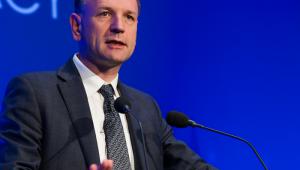The role and contribution of local authority chief executives are increasingly being discussed and questioned. Ministerial and tabloid attacks on their remuneration; reports on council funded personal development programmes; proposals for executive mayors and leaders; council mergers and multi-authority shared management arrangements - all lead back to the simple question: ‘why do we have chief executives?’
There is a risk here, not least arising from government and media claims about salaries and perks, that there is no serious debate around this question; and quite frankly, much of the discourse has been far too simplistic and ill-informed.
When the chief executive and her/his role becomes the major news story, then clearly something has gone wrong – and this is a situation that has the potential to be deeply damaging for local government itself. There needs to be a serious and informed debate about the role and contribution of the chief executive; his/her relationship with the elected mayor or council leader; their accountabilities and responsibilities; and their executive leadership role, both inside and outside the authority.
The relationship between chief executive and leader/elected mayor is one of the most important in any local authority. These are complementary roles and should be seen as such.
Politicians should determine policy and programmes, decide on the levels of taxes and charge, be the primary outward ambassador and ‘face’ of the authority to promote and defend policy and its implementation, and to shape the wider local place.
In contrast, the core role of the chief executive is clear. It is to turn the political will of the leader/mayor and council into tangible outcomes for local communities. It is a managerial and leadership role, leading an often large organisation; setting both tone and culture; leading change management programmes; fostering and developing talent; and ensuring that outcomes are achieved through behavioural change, partnerships, networking, commissioning, service delivery and contracting. It is a vital ‘executive’ role – but it is not, fundamentally, a political role.
The chief executive has a responsibility to deliver the politically determined programme but also to advise on any problems, unintended consequences, financial or legal constraints. She/he must ensure that the senior management team is fit for purpose, lead this team and hold them accountable for their performance and contribution to delivering the authority’s business plan. She/he must challenge the senior team and the wider organisation; build relations with local partner organisations; and ensure that internal vested interests do not prevent innovation and shared partnership working.
In extremis, the chief executive has a duty to intervene and prevent unlawful or fiduciary unsound decisions that a leader/mayor may wish to pursue – although usually the relationship should be such that such matters are addressed well before there is a need for intervention. Without chief executives, where would this independent responsibility come from?
The modern chief executive has to be: a great leader; excellent strategist and communicator; a skilled networker and negotiator; an able diplomat; and above all, has to be able to secure the delivery of outcomes in an efficient, effective and accountable manner.
The leader/elected mayor should: hold the chief executive to account; agree objectives; undertake appraisals; discuss critical issues and take professional advice and challenge from the chief executive; and respect the chief executive’s professional and statutory role and responsibilities. A leader should expect the chief executive to ensure that her/his programme is delivered. This, of course, is particularly challenging when the chief executive has more than one political leader through a shared management arrangement.
Given the size of many local authorities, it is vital that the right appointments to the role of chief executive are made. These are major businesses with large and in some cases extremely large budgets and responsibilities. The political environment; the accountabilities and public visibility of local authorities; and the importance and complexity of their responsibilities – which of course include responding to major natural incidents through to child protection, make the executive leadership role both vital and critical.
Therefore, one of the most important responsibilities for a leader or elected mayor is to ensure that their authority has a suitable and competent chief executive in place. In this regard, there are strong similarities with major private sector organisations where best practice very clearly differentiates between the role of non-executive chair and chief executive.
When it comes to salary comparisons, the private sector may not be the best benchmark but it would be wrong to attempt to avoid sensible and competitive remuneration arrangements. It is equally wrong to confuse the ‘political’ role of a leader or elected mayor with the ‘executive’ role of the chief executive.
However, if chief executives are to be recognised as critical to local public services and local wellbeing, it is incumbent on them to: act responsibly and effectively; avoid causing the wrong kind of headlines; continuously strive for and promote transparency, exemplar performance and improvement; and rebuke complacency, either in their own authority or nationally. Unfortunately too many local government chief executives (and senior officers) have a way to go yet in this regard.
The time has come for a real debate about the future role and nature of local government. This needs to address: place shaping and leadership; political leadership and accountability; managerial leadership; and most fundamentally, the role of the modern chief executive.
John Tizard is director of the Centre for Public Service Partnerships (CPSP@LGIU)










